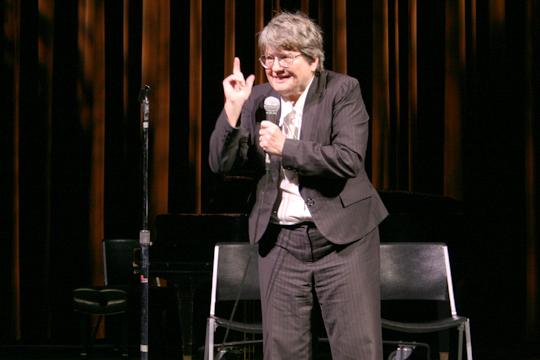“Dead Man Walking” discusses viewpoints of death penalty
March 9, 2011
Bestselling author and anti-death penalty advocate Sister Helen Prejean visited Washburn on Thursday for a reading of “Dead Man Walking,” a play based on her book of the same name. Theatre students read excerpts from the play to the audience. A discussion on capitol punishment followed the reading.
Prejean served as spiritual advisor to inmates condemned to death for their crimes. “Dead Man Walking” follows her journey with those men and describes the complex emotional conflict surrounding capital punishment.
“What the play is about, is to take you deeply into your own heart and face the ambivalence that we have to work through on this issue,” said Prejean. “It’s usually not a slam dunk thing with most of us; that we shouldn’t have the death penalty or I’m against the death penalty. We have to go through and look at it at the pain on both sides.”
“Dead Man Walking” is perhaps best known by the 1995 film adaptation of the same name starring Sean Penn and Susan Sarandon.
Students from the Washburn Theatre department participated in the reading of excerpts from “Dead Man Walking.” Samantha Heath, Brandon Blick, Amanda Royer, Colby Cox, Daniel Gilchrist and Janet Barr read the character dialogue to the audience of students, faculty and community members.
After the reading, audience members were invited to ask questions and give thoughts on aspects of the death penalty process. Attendees asked how it could be seen as cruel to sentence someone to the death when they have committed terrible acts, and if it was more economical to execute a criminal who would otherwise be taking up space in prison. Other audience members shared personal stories of being a juror on a murder trial and being the family of a murder victim.
Event organizers were excited by the discussions generated from the event.
“There may be discussions that happen in subsequent days from people who heard that story and were touched by it,” said Kansas Coalition Against the Death Penalty board chair Donna Schneweis. “There are people who will potentially be discussing the question of alternatives, the question of deterrence and the question of innocence.
Kansas is one of 35 states that currently allow the death penalty although it has not been used since 1965. Ten inmates in the state are currently on death row, the costs of which are 70 percent higher than the cost of non-death row inmates. This provides a strong economic motivation for changing Kansas law, according to the KSCADP.
The state legislature is currently considering a bill that would eliminate the death penalty in Kansas. HB 2323 would replace the punishment related to crimes currently warranting the death penalty to life in prison without the possibility of parole.



